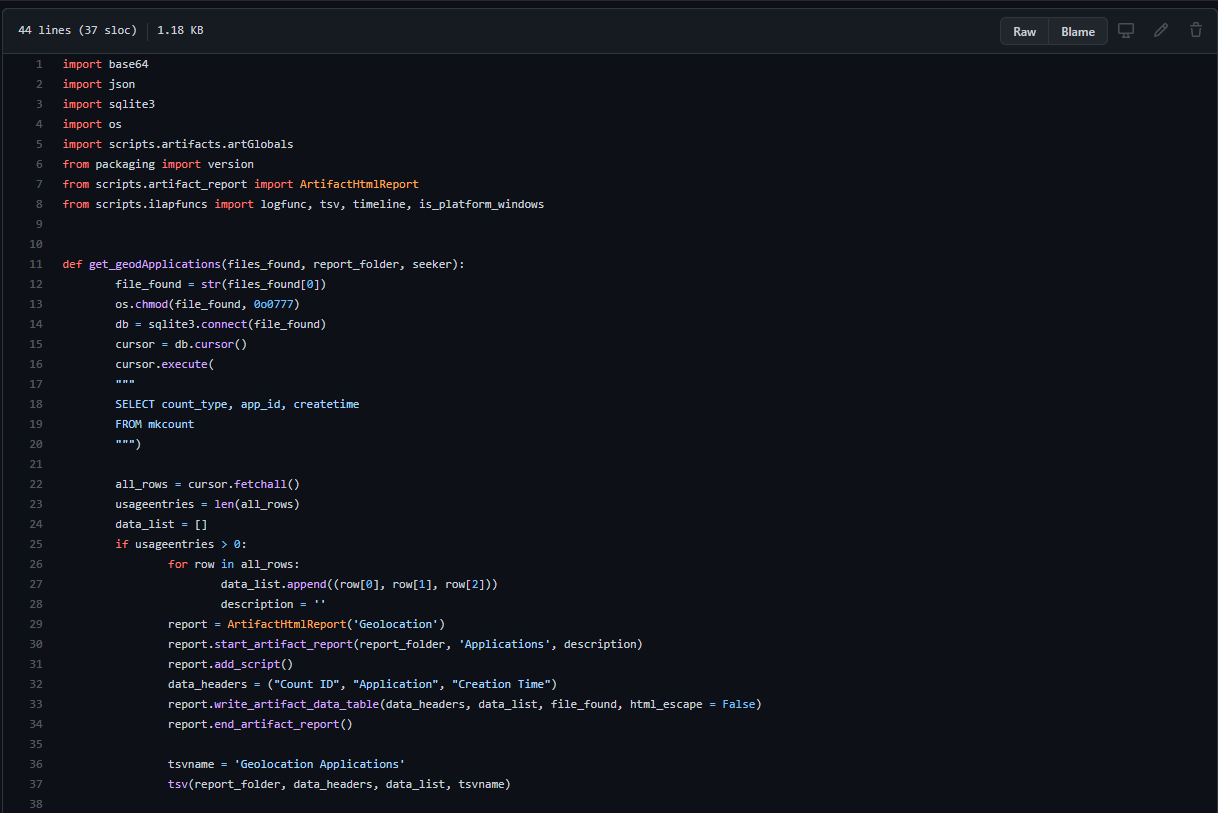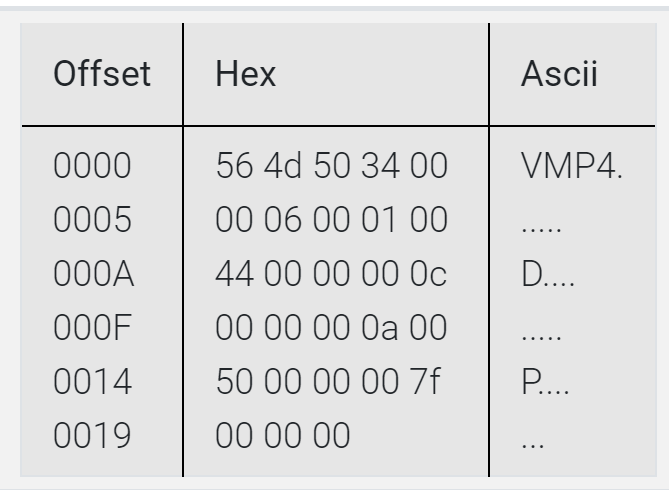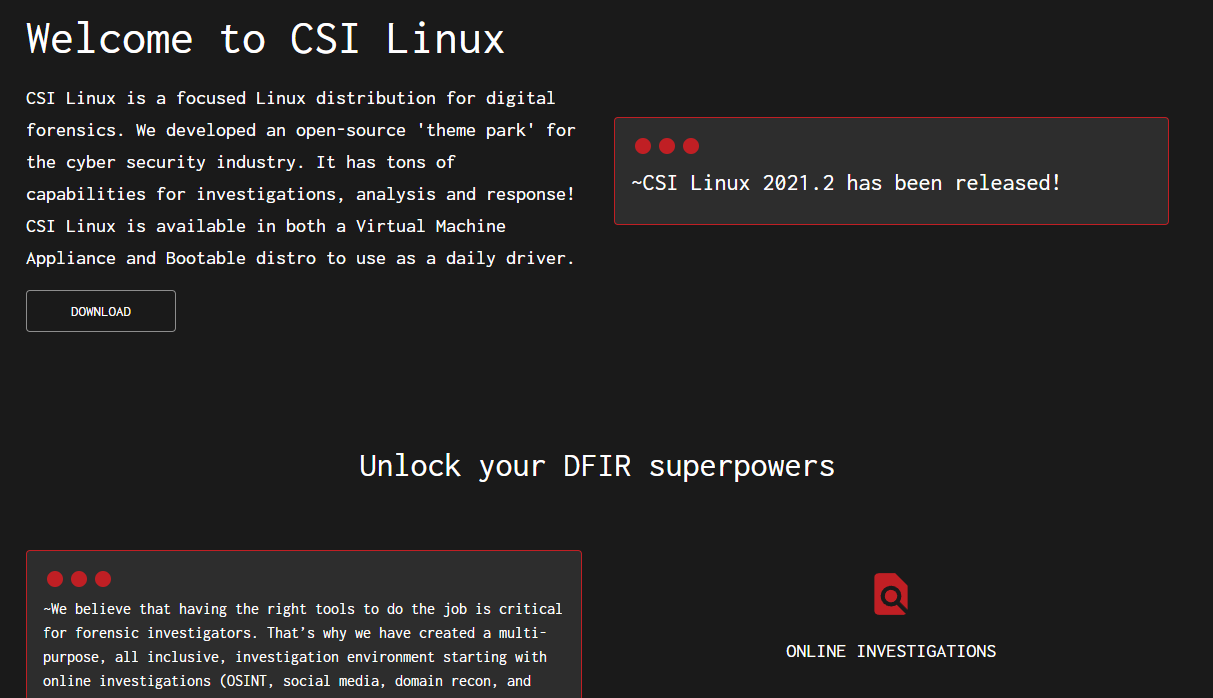iOS Forensics: iLEAPP updates

iLEAPP is written by Alexis Brignoni wrote iLEAPP to parse iOS logs, events, and plists. For part of my thesis--iOS Forensics: Data hidden within Map Cache Files--I extended iLEAPP to parse three different artifacts based around the com.apple.geod application:
- geodApplcations: List of applications who accessed the location cache
- geodMapTiles: Downloaded map tiles from applicaions displaying maps
- geodPDPlaceCache: Places a user examined in an application.
Each of these artifacts are talked about in detail in my blog post linked above and my submitted thesis (PDF).
Also, I added several new functions to support showing the map tiles in the report provided by iLEAPP. The major function, generate_hexdump(), provides an output similar to Linux "xxd" command.

By default, I am only showing the first 28 bytes but this can be changed with an argument.
The following code is the changes that I added which were merged in pull request #71.
ilapfuncs.py
''' Returns string of printable characters. Replacing non-printable characters
with '.', or CHR(46)
``'''
def strings_raw(data):
return "".join([chr(byte) if byte >= 0x20 and byte < 0x7F else chr(46) for byte in data])
''' Returns string of printable characters. Works similar to the Linux
`string` function.
'''
def strings(data):
cleansed = "".join([chr(byte) if byte >= 0x20 and byte < 0x7F else chr(0) for byte in data])
return filter(lambda string: len(string) >= 4, cleansed.split(chr(0)))
''' Retuns HTML table of the hexdump of the passed in data.
'''
def generate_hexdump(data, char_per_row = 5):
data_hex = binascii.hexlify(data).decode('utf-8')
str_raw = strings_raw(data)
str_hex = ''
str_ascii = ''
''' Generates offset column
'''
offset_rows = math.ceil(len(data_hex)/(char_per_row * 2))
offsets = [i for i in range(0, len(data_hex), char_per_row)][:offset_rows]
str_offset = '<br>'.join([ str(hex(s)[2:]).zfill(4).upper() for s in offsets ])
''' Generates hex data column
'''
c = 0
for i in range(0, len(data_hex), 2):
str_hex += data_hex[i:i + 2] + ' '
if c == char_per_row - 1:
str_hex += '<br>'
c = 0
else:
c += 1
''' Generates ascii column of data
'''
for i in range(0, len(str_raw), char_per_row):
str_ascii += str_raw[i:i + char_per_row] + '<br>'
return f'''
<table id="GeoLocationHexTable" aria-describedby="GeoLocationHexTable" cellspacing="0">
<thead>
<tr>
<th style="border-right: 1px solid #000;border-bottom: 1px solid #000;">Offset</th>
<th style="width: 100px; border-right: 1px solid #000;border-bottom: 1px solid #000;">Hex</th>
<th style="border-bottom: 1px solid #000;">Ascii</th>
</tr>
</thead>
<tbody>
<tr>
<td style="white-space:nowrap; border-right: 1px solid #000;">{str_offset}</td>
<td style="border-right: 1px solid #000; white-space:nowrap;">{str_hex}</td>
<td style="white-space:nowrap;">{str_ascii}</td>
</tr></tbody></table>
'''geoApplications.py
import base64
import json
import sqlite3
import os
import scripts.artifacts.artGlobals
from packaging import version
from scripts.artifact_report import ArtifactHtmlReport
from scripts.ilapfuncs import logfunc, tsv, timeline, is_platform_windows
def get_geodApplications(files_found, report_folder, seeker):
file_found = str(files_found[0])
os.chmod(file_found, 0o0777)
db = sqlite3.connect(file_found)
cursor = db.cursor()
cursor.execute(
"""
SELECT count_type, app_id, createtime
FROM mkcount
""")
all_rows = cursor.fetchall()
usageentries = len(all_rows)
data_list = []
if usageentries > 0:
for row in all_rows:
data_list.append((row[0], row[1], row[2]))
description = ''
report = ArtifactHtmlReport('Geolocation')
report.start_artifact_report(report_folder, 'Applications', description)
report.add_script()
data_headers = ("Count ID", "Application", "Creation Time")
report.write_artifact_data_table(data_headers, data_list, file_found, html_escape = False)
report.end_artifact_report()
tsvname = 'Geolocation Applications'
tsv(report_folder, data_headers, data_list, tsvname)
else:
logfunc('No data available for Geolocation Applications')
db.close()
returngeodPDPlaceCache.py
import base64
import json
import sqlite3
import os
import scripts.artifacts.artGlobals
from packaging import version
from scripts.artifact_report import ArtifactHtmlReport
from scripts.ilapfuncs import logfunc, tsv, timeline, is_platform_windows, strings
def get_geodPDPlaceCache(files_found, report_folder, seeker):
file_found = str(files_found[0])
os.chmod(file_found, 0o0777)
db = sqlite3.connect(file_found)
cursor = db.cursor()
cursor.execute(
"""
SELECT requestkey, pdplacelookup.pdplacehash, datetime('2001-01-01', "lastaccesstime" || ' seconds') as lastaccesstime, datetime('2001-01-01', "expiretime" || ' seconds') as expiretime, pdplace
FROM pdplacelookup
INNER JOIN pdplaces on pdplacelookup.pdplacehash = pdplaces.pdplacehash
""")
all_rows = cursor.fetchall()
usageentries = len(all_rows)
data_list = []
if usageentries > 0:
for row in all_rows:
pd_place = ''.join(f'{row}<br>' for row in set(strings(row[4])))
data_list.append((row[0], row[1], row[2], row[3], pd_place))
description = ''
report = ArtifactHtmlReport('Geolocation')
report.start_artifact_report(report_folder, 'PD Place Cache', description)
report.add_script()
data_headers = ("requestkey", "pdplacehash", "last access time", "expire time", "pd place")
report.write_artifact_data_table(data_headers, data_list, file_found, html_escape = False)
report.end_artifact_report()
tsvname = 'Geolocation PD Place Caches'
tsv(report_folder, data_headers, data_list, tsvname)
else:
logfunc('No data available for Geolocation PD Place Caches')
db.close()
return




